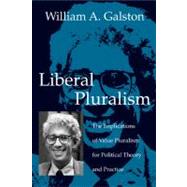Liberal Pluralism: The Implications of Value Pluralism for Political Theory and Practice
, by William A. Galston- ISBN: 9780521012492 | 052101249X
- Cover: Paperback
- Copyright: 5/6/2002
William Galston is a distinguished political philosopher whose work is informed by the experience of having served from 1993-1995 as President Clinton's Deputy Assistant for Domestic Policy. Isaiah Berlin first advanced the moral theory of value pluralism in the 1950s and it subsequently was developed by a number of distinguisthed scholars, including Galston. In Liberal Pluralism, Galston defends a version of value pluralism for political theory and practice. Against the contentions of John Gray and others, Galston argues that value pluralism undergirds a kind of liberal politics that gives great weight to the ability of individuals and groups to live their lives in accordance with their deepest beliefs about what gives meaning and purpose to life. This account of liberal pluralism is shown to have important implications for political deliberation and decision-making, for the design of public institutions, and for the division of legitimate authority among government, religious institutions, civil society, parents and families, and individuals. Liberal pluralism leads to a vision of a good society in which political institutions are active in a limited sphere and in which, within broad limits, families and civil associations may organize and conduct themselves in ways that are not congruent with the principles that govern the public sphere. William Galston is Professor, School of Public Affairs, University of Maryland and Director at the Institute for Philosophy and Public Policy. He is the author of Liberal Purposes (Cambridge, 1991), which won the Spitz Prize. Galston's other books include Justice and the Human Good (Chicago, 1980) and IKant and the Problem of History (Chicago, 1975). He is also a Senior Advisor to the Democratic Leadership Council and the Progressive Policy Institute.







